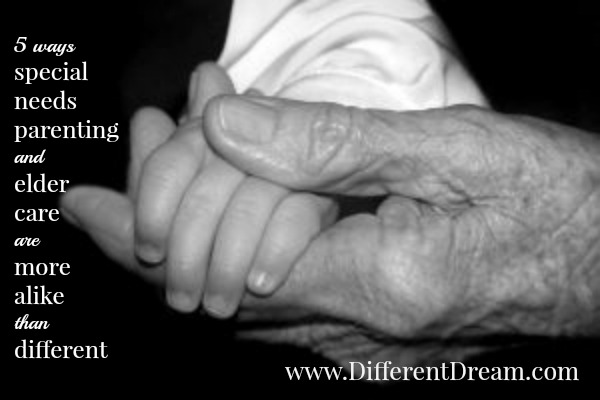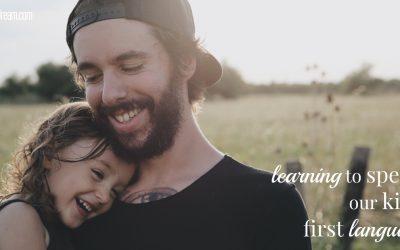5 Ways Special Needs Parenting and Elder Care Are Alike

For several months, my life has been more immersed in elder care than special needs parenting. And do you what to know the simple truth I’ve learned in these intense days and weeks of caring for my mother? It’s this: Special needs parenting and elder care are more alike than different. Here are five ways they are strikingly similar.
Similarity #1
Special needs parenting and elder care involve considerable contact with bodily fluids. I’ve never been a fan of frequent contact with bodily fluids, my own included. Even when my babies were sweet and cute, changing their diapers required a constant flow of self-talk to get through the task. At least they didn’t accuse me of mumbling like Mom does now and then.
Similarity #2
Special needs parenting and elder care require stellar detective skills. Skills like watching for clues when the person being cared for can’t use words to tell you what they need. Or looking for patterns to determine cause and effect and to accurately predict what might happen next. Or, when speech is possible, learning to ask questions that will elicit the information needed.
Similarity #3
Special needs parenting and elder care require perseverance. The kind of perseverance caregivers need to cut through red tape, to fill out government and insurance forms, to make follow up phone calls, to fill out appeal forms when government services and insurance reimbursement is denied, and to create filing systems for organizing reams of paperwork.
Similarity #4
Special needs parenting and elder care means holding lots of stuff. Both types of caregivers have to hold medical equipment, tempers, half-chewed bits of food, and tongues. But most of all, both kinds of caregivers hold the hands of those we love whenever they need a reassuring touch.
Similarity #5
Special needs parenting and elder care are exercises in putting others first. The moment you sit down to eat for the first time in 6 hours. As soon as you settle down to soak in a hot tub. When the in-home care provider doesn’t arrive so you can go on a long-anticipated shopping break.
The same thing keeps both types of caregivers going day after day, hour after hour, sleepless night after sleepless night. We keep going because no one loves our children and our aging parents like we do. And if we who love them don’t put them first, who will?
Other Similarities Between Special Needs Parenting and Elder Care
Have you cared for more than one age group? What similarities have you seen across the years? Leave a comment.
Do you like what you see at DifferentDream.com? You can receive more great content by subscribing to the quarterly Different Dream newsletter and signing up for the daily RSS feed delivered to your email inbox. You can sign up for the first in the pop up box and the second at the bottom of this page.
By Jolene
Jolene Philo is the author of the Different Dream series for parents of kids with special needs. She speaks at parenting and special needs conferences around the country. She’s also the creator and host of the Different Dream website. Sharing Love Abundantly With Special Needs Families: The 5 Love Languages® for Parents Raising Children with Disabilities, which she co-authored with Dr. Gary Chapman, was released in August of 2019 and is available at local bookstores, their bookstore website, and at Amazon.
4 Comments
Submit a Comment
Subscribe for Updates from Jolene
Related Posts
Transitioning Between Rhythms and Tempos
Music therapist Jim Gaven explains how his class transitioning between rhythms and tempos helps children more easily transition through life.
Love Is a Child’s First Language
Love is a child’s first language. By understanding attachment theory and stages of cognitive development we can better speak their language.
EA/TEF Is All in the Family for this Mother and Son
Not many moms can say EA/TEF is all in the family, but Corrin Ponte can. Today she offers advice from a unique vantage point.






So sorry you have to deal with this, Karen. You’re right about the difference between dealing with a toddler and dealing with aging adults. There’s a certain level of dignity they expect and deserve. And it’s so hard as caregivers to show that respect when they are dealing irrationally.
So sorry you have to deal with this, Karen. You’re right about the difference between dealing with a toddler and dealing with aging adults. There’s a certain level of dignity they expect and deserve. And it’s so hard as caregivers to show that respect when they are dealing irrationally.
When the elder (age 95 yrs 8 mon) is unhappy and into yelling and telling us we are stealing from her, throws things, and making your life miserable; you cannot just put them in time out … They act like they are 3 or 4; but in reality 95 … You have to stay calm and try to remember they deserve respect. But, truthfully, I am so tired of this and I just want out.
When the elder (age 95 yrs 8 mon) is unhappy and into yelling and telling us we are stealing from her, throws things, and making your life miserable; you cannot just put them in time out … They act like they are 3 or 4; but in reality 95 … You have to stay calm and try to remember they deserve respect. But, truthfully, I am so tired of this and I just want out.